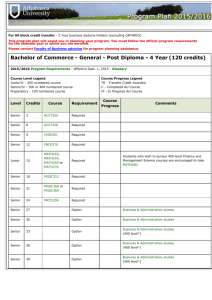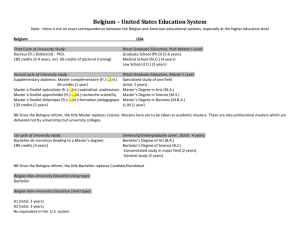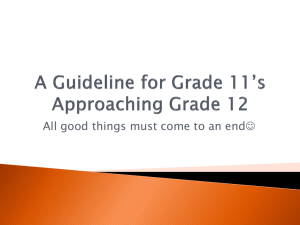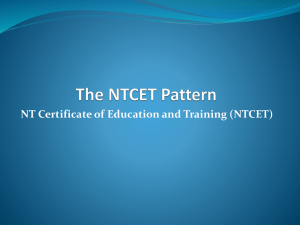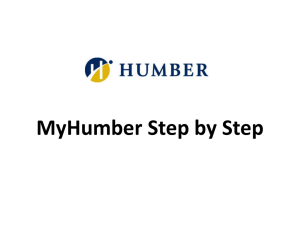Effective Training for GPs and Primary Care Workers in Mental health
advertisement
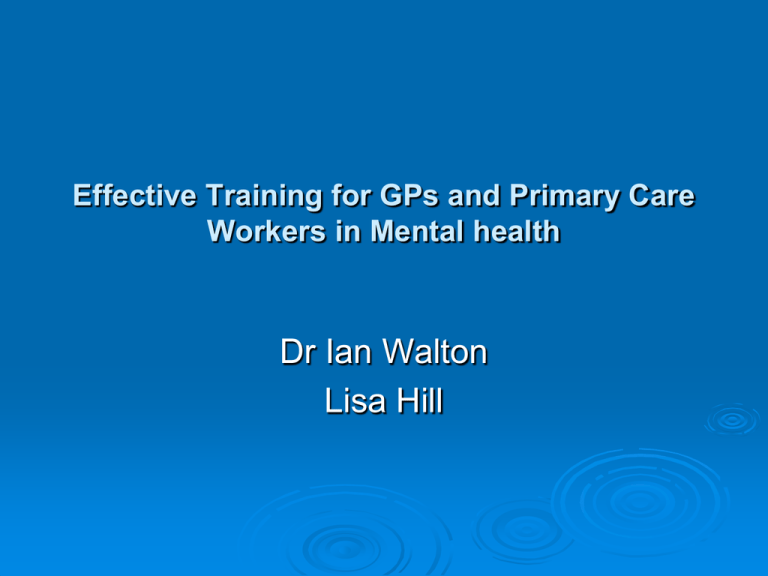
Effective Training for GPs and Primary Care Workers in Mental health Dr Ian Walton Lisa Hill The challenges Developing the skills to deliver an integrated model for mental health in primary care is an area lacking in investment within the UK. Government policies fail to focus on local and individual primary care requirements for the complexity of mental health work. Primary Care Education in Mental Health and Wellbeing Our education offers an opportunity to Experience specifically designed primary care focused education Gain an awareness of the emphasis on redesigning services to meet individual needs Develop skills which can be used in a 10 minute consultation 3 What next…… Certificate In Primary Care Mental Health 4 www.primhe.ning.com Accredited Module in Primary Care Mental Health Advanced Diploma in Primary Care Mental Health 13/04/2015 Masters science in Primary Care Mental Health 13/04/2015 Certificate in Primary Care Mental Health and Wellbeing OUTCOME Primary Care workers feel more capable and confident when working with people who need support with their mental health problems Aims of the course: Enable and empower people to live happy, healthy lives (service providers as well as recipients) Develop reflective practice Work towards effective leadership for mental health at local and regional levels Develop skills in accessing and critical evaluating research into mental health Deliver evidence based and consistent high quality health care in line with NICE guidelines best practice and WHO recommendations Link theory and evidence to practice Be able to evaluate and measure outcomes for clients and the service Facilitate closer working with service users, citizens and communities Accredited Module in Primary Care Mental Health Earn 15 University Credits at level 3 and 50 credits for GP revalidation - Case study based course which includes practical skills useful in the 10 minute consultation taught by local and national experts over four afternoons designed to inform you how better to use local resources. MODULE 1 Introduction -values and beliefs, anxiety and disorders, Phobia, Panic disorder, Dealing with and helping patients with the effects of distress, Wellbeing and self management of stress ,The importance of sleep, Strengths and limitations of diagnosis and categorisation, Categorisation models (ICD 10,DSMIV,V) and practical consequences of their uses MODULE 2 Depression, Unipolar and bipolar depression, The patient’s perspective, The carers perspective, Depression in the elderly, Suicide and risk, Self stigmatisation, Stepped Care Approach and “Watchful Waiting”,anti-depressant medication MODULE 3 Psychosis, helping primary care practices to achieve QoF ,Identification and management of risk, Shared care and working more effectively with patients with complex needs, The carers perspective, working with complex needs, substance and alcohol misuse, Dual Diagnosis ,working with complex needs, substance misuse and alcohol MODULE 4 Dementia, Older persons mental health needs, The carers perspective, Early onset dementias, Psychosomatic Medicine ,Medically unexplained symptoms, Why patients attend frequently and ways to help them 6 Advanced Diploma in Primary Care Mental Health Course outcomes: Improve the health outcomes for individuals with mental health problems when seen in general practice, Improve the recognition, diagnosis and treatment of patients with mental health problems, Develop and improve skills, knowledge and attitude that can be used in a ten minute consultation with patients suffering a mental health problem and an understanding of the range of problems seen in primary care Contribute to the evidence base for the continuing development of mental health services. ‘I thought I understood mental health but for the first time I saw it pulled together and become meaningful’ GP ‘Informative, challenging and has changed my whole practice.’ GP Each module is designed after careful deliberation using a range of expertise at a local and national level. Module 1 Anxiety Module 2 Depression Module 3 Psychosis Module 4 Dementia and medically unexplained symptoms Module 5 Substance Misuse. Addictions and Personality Disorder Module 6 Children’s and Maternal Mental Health Masters Science Specialist in Primary Care Mental health Postgraduate Certificate Level 7 Postgraduate Diploma Level 7 Masters Level 7 Year 1 Year 2 Year 3 Four Core Modules (15 credits x 4) Critical appraisal skills and research awareness. Facts, Beliefs and Values Leading and Enabling Service Development in Human Services Therapies, Interventions and Four Core Modules (15 credits x 4) Service Redesign Mental Health Legislation and Ethics-Consent and Capacity. Common Mental Disorders: Recognition, Assessment and Management Research methods and One Core Module (60 credits) Project Based Change. OR Masters Treatments methodologies. Total 60 credits Total 120 credits Dissertation Total 180 credits Evaluation using the four levels of Kirkpatrick’s model A meaningful evaluation of the learning via a steering group Level one: Happy sheets ‘are completed following individual speakers and feedback forms gather subjective personal reactions to the learning experience. The learning sets also enable individuals to discuss their feelings with their peers. We have 98% High satisfaction rate of the training Level two: Demonstrate an increase in knowledge and intellectual capability from before to after the learning experience through reflective case studies. All of the students who have submitted have passed the Diploma. Level three: Examines the extent of the learned behaviour and the capability for personal improvement and the implementation or application of what they have learned. This is scoped through reflective practice during the programme. Level four: Finally the overall results are evaluated and disseminated to demonstrate the effects on primary care through the performance and outputs of the primary care mental health workers. The course provides primary care workers with 50 credits, equivalent to a whole years revalidation. A course handbook lets applicants clearly see the learning outcomes desired from them. Level Four OUTCOMES It is evidenced that practices attending the training use less secondary care resources and are smarter at referring Staff are able to integrate pathways and share values GP practices are able to hit their targets (QOF) Patients have a better experience and there is a smooth transition from secondary to primary care Increased confidence in dealing with suicidality and risk within primary care. Further Information lisa.hill9@btinternet.com ianwalton@btinternet.com www.primhe.org.uk

